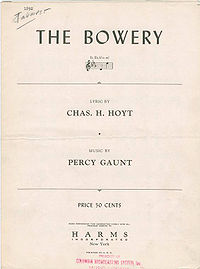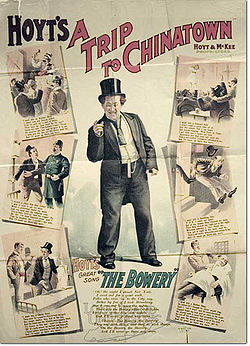
The Bowery (Song)
Encyclopedia

A Trip to Chinatown
A Trip to Chinatown is a musical comedy in three acts by Charles H. Hoyt with music by Percy Gaunt and lyrics by Hoyt, that became a silent film featuring Anna May Wong half a century later. In addition to the Gaunt and Hoyt score, many songs were interpolated into the score at one time or another...
with music by Percy Gaunt and lyrics by Charles H. Hoyt. The musical toured the country for several years, then opened on Broadway in 1891.
Description
The song is written in 3/4 time in a major key. The lyrics describe an incident in New York CityNew York City
New York is the most populous city in the United States and the center of the New York Metropolitan Area, one of the most populous metropolitan areas in the world. New York exerts a significant impact upon global commerce, finance, media, art, fashion, research, technology, education, and...
and have nothing to do with the plot, a story set in San Francisco. They consist of six verses interspersed with the chorus, which ends with the vow:
The Bowery, the Bowery,
I'll never go there anymore!
Although the Bowery
Bowery
Bowery may refer to:Streets:* The Bowery, a thoroughfare in Manhattan, New York City* Bowery Street is a street on Coney Island in Brooklyn, N.Y.In popular culture:* Bowery Amphitheatre, a building on the Bowery in New York City...
had been a section of New York City where theater life flourished from about 1860-1875, by the 1880s it had become a sordid district. The experience of the singer is described in part by the Village Voice
The Village Voice
The Village Voice is a free weekly newspaper and news and features website in New York City that features investigative articles, analysis of current affairs and culture, arts and music coverage, and events listings for New York City...
newspaper:
He's [the singer] buttonholed by a grifter and conned by a shopkeeper before entering "a concert hall," where he starts a row because he thinks "A New Coon in Town" is directed at him. Bye-bye rube: "A man called a bouncer attended to me./I'll never go there any more."
Lyrics
The Bowery by Charles H. Hoyt and Percy Gaunt From the Broadway play A Trip to Chinatown (1891) Oh! the night that I struck New York, I went out for a quiet walk; Folks who are "on to" the city say, Better by far that I took Broadway; But I was out to enjoy the sights, There was the Bow'ry ablaze with lights; I had one of the devil's own nights! I'll never go there anymore. Refrain The Bow'ry, the Bow'ry! They say such things, And they do strange things On the Bow'ry! The Bow'ry! I'll never go there anymore! Verse 2 I had walk'd but a block or two, When up came a fellow, and me he knew; Then a policeman came walking by, Chased him away, and I asked him why. "Wasn't he pulling your leg?," said he. Said I, "He never laid hands on me!" "Get off the Bow'ry, you Yap!," said he. I'll never go there anymore. (Repeat Refrain) Verse 3 I went into an auction store, I never saw any thieves before; First he sold me a pair of socks, Then said he, "How much for the box?" Someone said "Two dollars!" I said "Three!" He emptied the box and gave it to me. "I sold you the box not the sox," said he, I'll never go there any more. (Repeat Refrain) Verse 4 I went into a concert hall, I didn't have a good time at all; Just the minutes that I sat down Girls began singing, "New Coon in Town," I got up mad and spoke out free, "Somebody put that man out," said she; A man called a bouncer attended to me, I'll never go there anymore. (Repeat Refrain) Verse 5 I went into a barbershop, He talk'd till I thought that he'd never stop; I, cut it short, he misunderstood, Clipp'd down my hair just as close as he could. He shaved with a razor that scratched like a pin, Took off my whiskers and most of my chin; That was the worst scrape I'd ever been in. I'll never go there anymore. (Repeat Refrain) Verse 6 I struck a place that they called a "dive," I was in luck to get out alive; When the policeman heard of my woes, Saw my black eye and my batter'd nose, "You've been held up!," said the copper fly. "No, sir! But I've been knock'd down," said I; Then he laugh'd, tho' I could not see why! I'll never go there anymore! (Repeat Refrain) |
History

Sheet music
Sheet music is a hand-written or printed form of music notation that uses modern musical symbols; like its analogs—books, pamphlets, etc.—the medium of sheet music typically is paper , although the access to musical notation in recent years includes also presentation on computer screens...
and has remained a familiar song.

